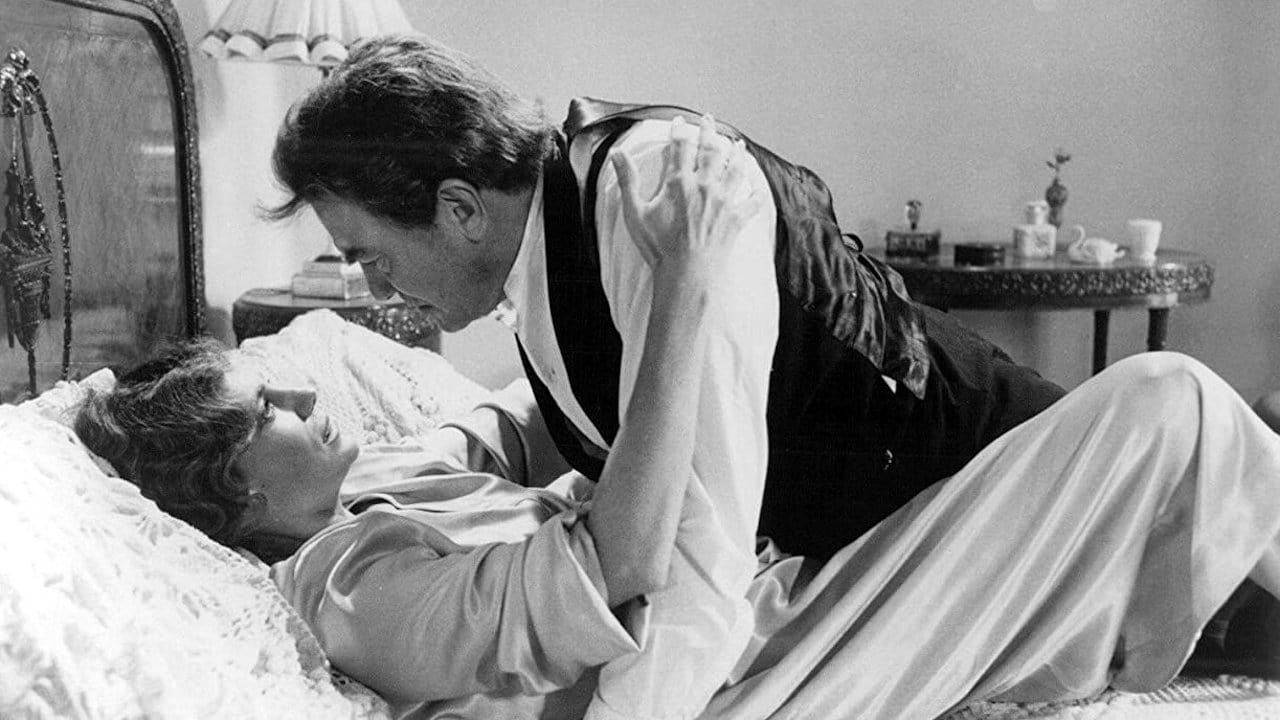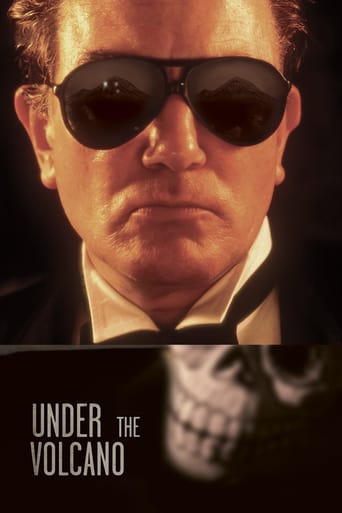Softwing
Most undeservingly overhyped movie of all time??
StyleSk8r
At first rather annoying in its heavy emphasis on reenactments, this movie ultimately proves fascinating, simply because the complicated, highly dramatic tale it tells still almost defies belief.
Calum Hutton
It's a good bad... and worth a popcorn matinée. While it's easy to lament what could have been...
Philippa
All of these films share one commonality, that being a kind of emotional center that humanizes a cast of monsters.
jovana-13676
Had Albert Finney performed all alone in an empty room, it would have still been an equally entertaining film. Yes, for all its tragedy, the film is entertaining. Whenever Albert Finney speaks, and he hardly keeps his mouth shut during the film, it's pure poetry. It's one of the best scripts, not only dialogue wise, but the way it manages to bring to the screen and make us interested in one day in drunk's life. The characters are written so that one can hope for a happy ending - they are idealists. The drunk, his wife (Jacqueline Bisset) and brother (Anthony Andrews) are no ordinary people, they are all romantics who love one another and the world (it's 1938 and Nazism is on the rise), and in turn, we care about them and want this case of alcoholism / broken marriage to be fixed somehow. Or maybe if the guy is doomed then his wife can hope for a better life with his brother? Not so. This movie is like falling off a cliff and it ends abruptly. One can hardly believe it, because it's photographed beautifully and Jacqueline Bisset truly looks heaven sent. The opening Day of the Dead sequence is both stunning and foretelling.
jbirks106
I don't think I have ever seen a movie quite as deliberately and aggressively depressing as "Under the Volcano." In fact, I can hardly even imagine a more unpleasant film. It should be required viewing at AA meetings, as the central character could almost be said to be the tequila and mescal that Geoffrey, the nominal lead, guzzles from beginning to end. There is no plot to this movie. But there is Albert Finney, and that's just enough. It is a performance that saves "Under the Volcano" from director John Huston's almost sadistically morose tale. If there has ever been a better celluloid depiction of raging alcoholism, I haven't seen it. Finney is by turns funny, morbid, loving and spiteful. Did I mention that he drinks? Yes, he drinks. He drinks in bars, at home, at bullfights and even on carnival rides. His drinking isn't excessive, it's superhuman. Joining Finney in Mexico is his estranged wife, Yvonne, played by Jacqueline Bisset. Hers is an even more incomprehensible character: bright, beautiful and seemingly sane, Yvonne returns to Mexico in hopes of salvaging a marriage that I for one can't believe ever took place. There is no chemistry between Finney and Bisset. The other principal character, Geoffrey's half-brother Hugh, has also just arrived in Mexico from Spain, where he claims to have fought in the civil war. He and Yvonne had an affair once, but it's clear that neither intends on rekindling it for fear of sending Geoffrey even further into besotted self-pity and self-loathing. Bisset and Anthony Andrews, who plays Hugh, are fine actors, but their characters are preposterous and superfluous. Geoffrey doesn't deserve either of their affection, and the harder they try, the harder he resists.I am not a fan of the "feel good" movies of redemption that so often fill theaters these days. But "Under the Volcano" is the ultimate "feel bad" film. If not for Finney's truly amazing performance, I wouldn't recommend this film to friend or foe. But Finney takes one of the hoariest clichés in cinema and inhabits it convincingly, refreshingly, heart-breakingly. Because of him, you will not easily forget "Under the Volcano," however much you wish you could.
nomorefog
This movie version of 'Under the Volcano' is for me a godsend. The reason for this somewhat indulgent gratitude is because this is a book I have been struggling with for a number of years, the exact number I refuse to divulge because it would make me sound like an idiot. When I choose to read it, it sends me to sleep; when I am awake it drives me crazy. I ignore it, and feel guilty. I start to read it again and go through the entire process over; it isn't a lot of fun. To make a leap of off-topic logic, I have no intention of comparing the book to the film. I feel embarrassed to say that this a reasonably successful attempt at adapting a notoriously difficult work of fiction. The movie version of 'Under the Volcano' is something that can stand on its own, as well as encourage more interested members of the audience to return to the source material, or at least give it a try, which is what I've been trying to do for years. Albert Finney gives a tour de force performance as Geoffrey Firmin, a diplomat living in Mexico who appears to have finally succumbed to the ravages of alcoholism. His wastrel half-brother is trying to assist, but it seems no use. His ex-wife who has left him returns perhaps for not the most altruistic of reasons, but seems unaware of how dangerously close he is to complete oblivion and an unmourned death. This does not sound like terribly exciting stuff. Director John Huston and writer Guy Gallo make a valiant attempt to insert some of Lowry's symbolism into the narrative, without making it too obscure for the audience to follow, at least for those who have been previously acquainted with the book. There are many performances in the filmic canon of men coping with a substance abuse problem and I think that Albert Finney is phenomenal playing a drunk; he is in fact drunk throughout the entire film, and I don't know if that's ever been done before. The audience is expected to forget that he is actually, constantly drunk, and the performance works beautifully. Jacqueline Bisset is impressive as Yvonne, a mature role for an actress who knows her business and acquits herself admirably. Anthony Andrews as Hugh seems to have had some of his part cut out of the movie, but he is frank and fresh faced and gives an intelligent performance. I give 'Under the Volcano' high marks. As an adaptation of a novel which was thought to be unfilmable, it makes a good account of itself. I should also mention the location shooting which lends a nice authenticity, the casting of many locals as extras (such as the old lady playing dominoes with a chicken) and lovely photography and set design. 'Under the Volcano' is a profound version of its complex and brilliant source material, which to me is a good reason to recommend it.
Nick Dets
John Huston's adaptation of Malcom Lowry's celebrated novel is very much like his adaptation of Flannery O'Connor's "Wise Blood": foggy, dreamlike and at times unwatchable. Huston finds a strange, distant tone that is somewhere between ironic and completely bizarre, with intentionality that is questionable at best. Even though Huston was getting old at this point, he was still tackling challenging material in his old age, which possibly explains the odd mix of provocative, dense material with stilted, unintuitive storytelling. If his age isn't the main culprit for the film's weird failings, then it may be his stiflingly traditional film-making, which seemed a bit outmoded in 1984. Either way, the film never finds a proper stylistic center, causing "Under the Volcano" to continually sink into incoherence.Huston's most grave misstep was his choice to pace the film with mostly static shots and slow editing rhythms. For being so conservatively made, there is an almost constant lack of clarity, as no one element in the film complements the other. Albert Finney's go-for-broke performance as British diplomat Geoffery Firmin is fearless and raw, but Huston's shot selections and mostly bland mise-en-scene distract from the brimming anger and pain the actor tries so nakedly to express. Similarly, the absorbing, mythical imagery of the story's Mexican "Day of the Dead" setting instead feels random as the foregrounded symbolism seems ham-fisted where it should have been atmospheric. Instead of casting the story's eerie spell, Huston's film-making suffocates the material, causing it to become overblown yet underdeveloped.That is all not to say Huston is completely to blame, however. Screenwriter Guy Gallo's task of condensing such enormous, literary ideas into a stand alone two-hour film is admirable, and structurally he does great things to keep the story immediately revolving around Geoffory's character arc, but by the end it feels like too many corners were cut to make it happen. The character of Hugh, Geoffery's dashing half-brother, is extremely undeveloped to the point of feeling unnecessary, and Yvonne, Geoffery's estranged wife, is never given the psychological need that would make her sympathy toward him credible. Even worse, the conclusion comes with a clumsy thud, ending the film suddenly and untidily.(2 out of 4)

